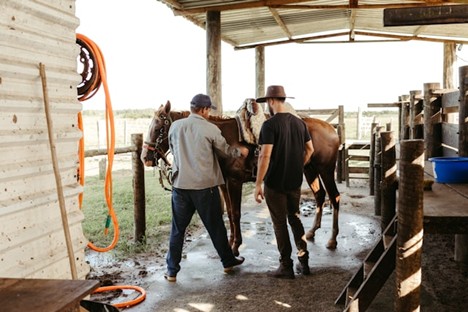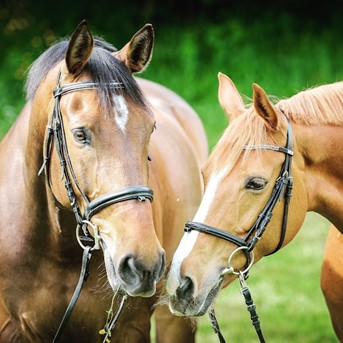
Creating a clear, legally sound horse boarding agreement is one of the most important steps horse owners and boarding facility operators can take to protect their interests. These contracts go far beyond simple handshake deals - they serve as binding legal documents that outline the duties, rights, and expectations of each party. A well-crafted agreement helps prevent misunderstandings, provides a roadmap for handling disputes, and ensures that both the horse’s care and the business arrangement remain on solid footing.
From boarding fees and feeding schedules to liability waivers and emergency procedures, boarding agreements must be detailed and tailored to the specific services provided.
Equine legal solutions emphasize the importance of tailoring boarding contracts to fit the specific needs of each facility and horse. Legal professionals who specialize in equine matters often caution against using one-size-fits-all templates, as each boarding operation has its own policies, and every horse may require different care or accommodations. A customized agreement helps ensure clarity, reduce liability, and prevent disputes down the line.
The following article discusses the most common and crucial clauses found in boarding contracts, clarifies who is responsible for veterinary care, and outlines how to legally manage issues like payment disputes, liability concerns, and termination of services.
Transparency regarding fees is fundamental in any boarding agreement. Contracts should clearly specify the exact services included in the standard boarding fee, such as daily feeding, stall cleaning, and turnout. In addition, any extra services - like blanketing, grooming, administering medication, or special feeding routines - should be itemized with their associated costs. By clearly outlining these details, along with payment due dates and accepted payment methods, both the horse owner and the facility can maintain a smooth, professional financial relationship and avoid misunderstandings down the line.
The agreement should define the standard of care the facility commits to providing. This includes:
Specifying health monitoring practices in a boarding agreement ensures that both parties have aligned expectations regarding the horse's daily routine and overall well-being. This may include outlining responsibilities such as daily wellness checks, noting signs of illness or injury, and communicating concerns promptly to the owner.
The contract can address protocols for administering medications, managing chronic conditions, and responding to medical emergencies, such as when a vet should be called and who is responsible for associated costs. Including these details not only helps safeguard the horse’s health but also establishes a clear standard of care and accountability, giving both the owner and the boarding facility peace of mind.
Clarifying who is responsible for routine and emergency veterinary care is crucial to avoid confusion and delays in treatment. The contract should address which party - the horse owner or the boarding facility - is authorized to contact a veterinarian and under what circumstances. It should also specify who will bear the costs for routine services such as vaccinations, deworming, dental care, and annual health exams.
For emergencies, the agreement should include procedures for contacting the owner, the extent of treatment that can be administered in the owner’s absence, and a cap on expenditures if the owner cannot be reached. Additionally, it’s wise to include the name and contact information of the preferred veterinary provider and outline whether the facility is obligated to use that vet or can call their own in urgent situations. Establishing these guidelines in writing ensures timely care for the horse and protects both parties from financial and legal misunderstandings.

Liability clauses are a vital component of any well-drafted horse boarding agreement, offering legal protection to both the horse owner and the boarding facility in the event of accidents, injuries, or unforeseen incidents. These clauses outline responsibilities and help define who is liable, under what circumstances, should something go wrong.
This section typically limits the boarding facility’s liability for injuries or accidents involving the horse while in their care, provided that reasonable care and standard operating procedures are followed. It may also cover property damage or injury to third parties (such as visitors or other boarders) caused by the horse. Boarding facilities often include language requiring horse owners to acknowledge the inherent risks of equine activities, as defined under local equine activity statutes, and to waive the right to pursue certain legal claims.
The contract should clearly define what constitutes “reasonable care” and outline the standard services provided by the stable (such as daily feeding, turnout, and stall cleaning). It should also include provisions regarding the staff's conduct and their role in administering care or handling emergencies. These terms ensure that expectations are clearly communicated and that the stable is not held responsible for issues outside their control or scope of service.
To balance protection, the agreement should also address the horse owner's liability for any injury or damage caused by their horse. Many boarding facilities require proof of liability insurance from the owner to cover these potential events. Including a clause that mandates up-to-date insurance not only safeguards the stable but also ensures that the owner is financially prepared in case of an accident.
Including thorough and well-explained liability clauses is essential for reducing the risk of legal disputes and promoting a mutually respectful and professional relationship between horse owners and facility managers.
Risk of loss and hold harmless clauses are critical components in any equine boarding agreement, as they clearly allocate responsibility for unexpected events that could result in injury, illness, theft, or even the death of a horse while under the care of the boarding facility. These clauses are designed to mitigate disputes and provide legal clarity in emotionally and financially difficult situations.
Typically, these provisions state that the horse owner assumes the inherent risks associated with boarding a horse, acknowledging that despite the stable’s best efforts, not all risks can be eliminated. This includes unforeseen events such as natural disasters, acts of God, infectious disease outbreaks, or accidents involving other animals on the property. In essence, the owner agrees that the stable cannot be held liable for circumstances beyond its reasonable control.
The "hold harmless" language goes a step further, protecting the boarding facility and its staff from legal claims, provided that the stable has not acted with negligence or willful misconduct. This means that unless the injury or loss occurred as a direct result of the stable’s failure to provide a reasonable standard of care or blatant disregard for safety, the facility is not financially responsible for the outcome.
These clauses often also recommend or require that horse owners carry appropriate insurance to help cover unexpected veterinary bills or loss. Including this recommendation not only protects the owner financially but reinforces that the stable is not an insurer of the horse’s well-being.
By understanding and addressing these risks upfront, both the horse owner and the facility can enter into the agreement with greater confidence and clarity, fostering a more trusting and secure boarding relationship.
A well-structured horse boarding agreement is vital for ensuring a clear, mutually beneficial relationship between the horse owner and the boarding facility. By defining key elements such as fees, standard of care, liability provisions, and veterinary responsibilities, both parties can avoid misunderstandings and mitigate potential disputes. Whether addressing the responsibility for veterinary care, detailing insurance requirements, or clarifying emergency protocols, the inclusion of specific and thorough clauses in the boarding agreement safeguards the interests of both the horse owner and the facility.